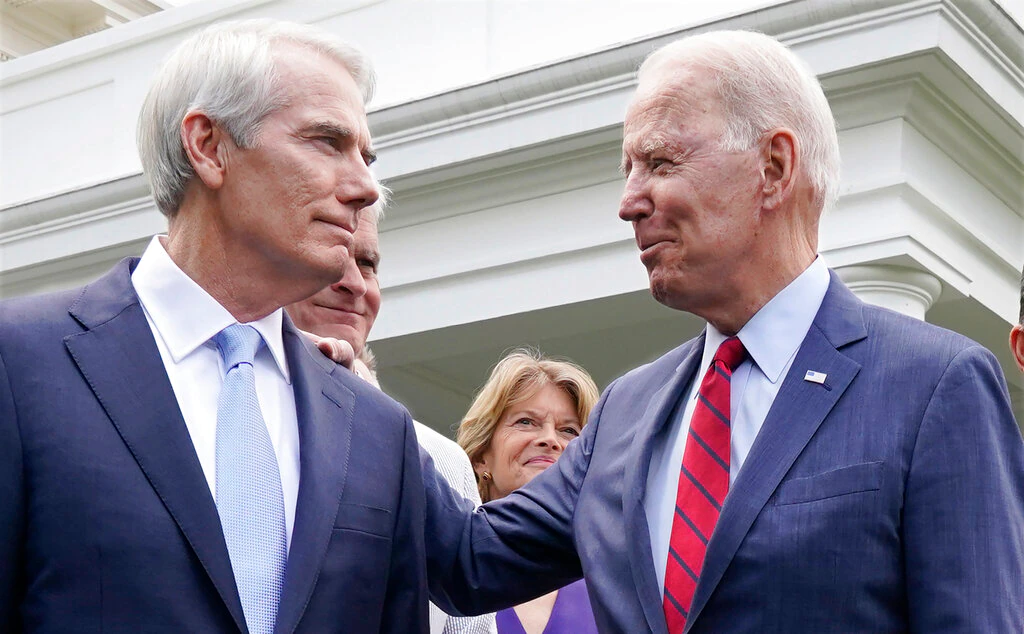WASHINGTON – Aiming to preserve a fragile bipartisan deal on infrastructure, President Joe Biden said Saturday that he didn’t mean to suggest he would veto the bill unless Congress also passed a larger package to expand the social safety net.
Speaking Thursday when the deal was reached, Biden said the two packages needed to move in “tandem” and “if they don’t come, I’m not signing. Real simple.”
Those comments sparked criticism from some Republican lawmakers who were party to the deal. Biden sought Saturday to clarify his position.
“My comments also created the impression that I was issuing a veto threat on the very plan I had just agreed to, which was certainly not my intent,” he said.
Tension eases
Biden had been holding out hope of reaching a bipartisan deal on infrastructure — a yearslong Washington priority — with Democrats pursuing the larger second bill on party lines through the budget reconciliation process.
Tensions appeared to have cooled Saturday after White House negotiators Steve Ricchetti and Louisa Terrell assured senators that Biden remained enthusiastic about the deal.
“My hope is that we’ll still get this done,” said Senator Rob Portman of Ohio, the lead Republican negotiator, in an interview Friday with The Associated Press.
“It’s really good for America. Our infrastructure is in bad shape,” he said. “It’s about time to get it done.”
The sudden swings point to the difficult path ahead for what promises to be a long process of turning Biden’s nearly $4 trillion infrastructure proposals into law.
What had been a celebratory moment for Biden and a group of 10 senators this past week with the announcement of a rare bipartisan accord was jolted by Biden’s insistence at a news conference that he would not sign this initial bill unless Congress also passed his broader package of proposed investments.
The two measures were always expected to move together through Congress: the bipartisan plan and a second bill that would advance under special rules allowing for passage solely with majority Democrats votes. But the president then conditioned one on the other.
Some senators felt blindsided by what they said was a shift in their understanding of his position.
The White House didn’t explicitly walk back Biden’s remarks, but the message conveyed in the latest round of calls and public statements sought to allay senators’ concerns.
In Biden’s call to the Democratic negotiator, Arizona Senator Kyrsten Sinema, the president said he looked forward to signing both bills, the White House said.
Not all senators were swayed by the White House outreach, which came after a tumultuous past month of on-again, off-again negotiations over Biden’s top legislative priority.
Companion package
The Democrats’ two-track strategy has been to consider both the bipartisan deal and their own more sweeping priorities side by side, as a way to assure liberals the smaller deal won’t be the only one.
But Biden’s pledge to essentially veto or refuse to sign the bipartisan accord without the companion package, now eyed at nearly $6 trillion in child care, Medicare and other investments, was an additional step that throws the process into doubt.
A bipartisan accord has been important for the White House as it tries to show centrist Democrats, including Sinema, Senator Joe Manchin of West Virginia and others that it is working with Republicans before Biden tries to push the broader package through Congress.
“There’s a lot of conversations taking place right now as to what the president meant,” said Senator Bill Cassidy, R-La., in an interview with a Fox affiliate in New Orleans shared by his office.
Cassidy noted that the president may have misspoken and said he hoped “it won’t be as if we crafted something just to give the president a point of leverage to get something that Republicans disagree with.”
Ten Republican senators would be needed to pass the bipartisan accord in the 50-50 Senate, where 60 votes are required to advance most bills.
While the senators in the bipartisan group are among some of the more independent-minded lawmakers, known for bucking their party’s leadership, it appears criticism by Senate Republican leader Mitch McConnell of Biden’s approach could peel away GOP support.













































